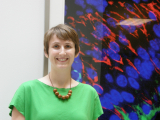Bad Influence: EWS/FLI Alters LSD1 and NuRD Interactions to Enforce Oncogenic Function in Ewing’s

Background
Ewing’s sarcoma is an aggressive pediatric bone tumor characterized by the EWS/FLI fusion gene. While advances in multimodal therapy have raised disease-free survival rates above 70% for patients with localized disease, survival rates for in metastatic and refractory cases remain stuck below 30%. We need better therapeutic strategies for these patients. EWS/FLI remains challenging to treat with drugs directly and sequencing of patient tumors failed to identify additional drug-treatable mutations common across patients.
This project studies the protein complexes assembled by EWS/FLI in the nucleus to activate tumor-promoting genes and silence tumor-suppressing genes. These complexes contain drug-treatable protein subunits, like histone deacetylases (HDACs) and HDAC inhibitors and those actively pursued as novel targets, such as lysine-specific demethylase 1 (LSD1). Such "epigenetic" mechanisms are commonly co-opted to enforce tumorigenic gene expression in pediatric tumors with otherwise stable genomes. Epigenetic regulation is complex, context-dependent, and incompletely understood. Thus, while epigenetic therapies hold great promise for pediatric cancers and Ewing’s sarcoma specifically, our ability to implement effective clinical regimens is limited.
Project Goal
This proposal focuses on the nucleosome remodeling and deacetylase (NuRD) and LSD1-containing complexes previously identified by our group as critical EWS/FLI co-conspirators. Moreover, the pharmacological blockade of both NuRD and LSD1 impairs EWS/FLI-mediated gene regulation. We propose to define exactly how EWS/FLI alters NuRD and LSD1 function. Achieving this goal 1) furthers our ability to advance LSD1 inhibitors for Ewing’s sarcoma patients and 2) establishes a paradigm for linking deep basic science to drug-treatable epigenetic phenomena in mutationally quiet pediatric cancers.
"By prioritizing questions relevant to pediatric malignancies, Alex's Lemonade Stand Foundation enables young investigators to pursue routes of inquiry more impactful to patient care. The mechanisms which cause pediatric cancer not only matter to our young patients, but also illuminate the ways in which biology is altered in other diseases, and must not be overlooked. These research pursuits, while important, do not often garner the same level of government support as other major diseases. Support from ALSF during my early career enhances my ability to pursue these pressing questions and fosters my independent research career focused on pediatric cancer." - Emily Theisen, PhD
Project Update - 2020
With the support of Alex’s Lemonade Stand Foundation, we have demonstrated that EWS/FLI, the protein that causes Ewing sarcoma, uses multiple strategies to misregulate genes in disease. We now know that LSD1, a novel therapeutic target for this disease, is kidnapped from its normal function to help EWS/FLI in some, but not all of these cancer-causing strategies. This advance is important to understand which strategies are the most important to disrupt to cure this aggressive disease. In the bigger picture, we have identified that the scope of EWS/FLI’s bad behavior in the cell is more widespread than previously appreciated and we are initiating new collaborations with genomics and proteomics experts to design the right experiments to fully understand EWS/FLI function and identify new ways to attack Ewing sarcoma cells.

